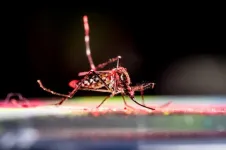(Press-News.org) Researchers at the Beckman Institute for Advanced Science and Technology developed an automated laboratory robot to run complex electrochemical experiments and analyze data.
With affordability and accessibility in mind, the researchers collaboratively created a benchtop robot that rapidly performs electrochemistry. Aptly named the Electrolab, this instrument greatly reduces the effort and time needed for electrochemical studies by automating many basic and repetitive laboratory tasks.
The Electrolab can be used to explore energy storage materials and chemical reactions that promote the use of alternative and renewable power sources like solar or wind energy, which are essential to combating climate change.
“We hope the Electrolab will allow new discoveries in energy storage while helping us share knowledge and data with other electrochemists — and non-electrochemists! We want them to be able to try things they couldn’t before,” said Joaquín Rodríguez-López, a professor in the Department of Chemistry at the University of Illinois Urbana-Champaign.
The interdisciplinary team was co-led by Rodríguez-López and Charles Schroeder, the James Economy professor in the Department of Materials Science and Engineering and a professor of chemical and biomolecular engineering at UIUC. Their work appears in the journal Device.
Electrochemistry is the study of electricity and its relation to chemistry. Chemical reactions release energy that can be converted into electricity — batteries used to power remote controllers or electric vehicles are perfect examples of this phenomenon.
In the opposite direction, electricity can also be used to drive chemical reactions. Electrochemistry can provide a green and sustainable alternative to many reactions that would otherwise require the use of harsh chemicals, and it can even drive chemical reactions that convert greenhouse gasses such as carbon dioxide into chemicals that are useful in other industries. These are relatively simple demonstrations of electrochemistry, but the growing demand to generate and store massive amounts of energy on a much larger scale is currently a prominent challenge.
One type of battery, known as a redox-flow battery, is used for grid-level storage and can store and bring power to entire electrical grids. The batteries explored by this collaboration use organic molecules to store energy and can be easily altered or tuned by changing the structure of those molecules. A major drawback of exploring redox-flow battery conditions is that it takes a lot of time and effort to identify a system that works, said Michael Pence, a graduate student of the Rodríguez-López Laboratory and a 2023 Beckman Institute Graduate Fellow.
The Electrolab started as an idea between Rodríguez-López and Schroeder based on collaborative project funded by the Joint Center for Energy Storage Research, an Energy Innovation Hub of the U.S. Department of Energy focused on advancing battery science and technology. Rodríguez-López and Schroeder put together an interdisciplinary team including programmers, engineers, and electrochemists. Initially, the idea was to create a microfabricated design, but the team decided to prioritize accessibility and transferability.
After establishing the final design of the Electrolab, the research group successfully created and tested an affordable device that is highly adaptable, made from common parts, and costs about $1,000 to build, which is key for its adoption by laboratories of all sizes. The team is openly sharing construction plans for this instrument, so that all researchers can benefit from it.
There are two main components of the Electrolab: hardware and software. The hardware consists of a standard 3D printer frame that was transformed into a solution-handling robot; microfabricated electrode arrays, or eChips; and electrochemical hardware. The frame allows the robot to move around within a designated area above electrochemical cells to dispense different liquids. The eChips measure electrical current which is necessary for understanding the electrochemical measurements.
The software component was created in Python (a free, open-source coding platform) that allows the user to connect with Electrolab to perform experiments. The software allows for fully automated data analysis, visual graphics, and plotting. When paired with machine learning, the Electrolab transforms from a robot completing predetermined tasks to a robot that can make decisions about the direction of the experiment while it is happening. Typically, an electrochemist handpicks datasets of interest to move forward, but the Electrolab uses the data it is collecting and analyzing in real time to make the next move. In other words, the Electrolab is making this science electro-fast.
The bottleneck of electrochemical characterization is the time required for in-depth analysis and characterization of new molecules and solutions. These are tasks like measuring voltages at which battery materials charge and discharge and figuring out the speed of side reactions. There are almost limitless ways to explore and tweak these systems but simply not enough time or bandwidth to explore every option.
The Electrolab is accelerating the discovery of new materials and will ultimately help combat climate change. Studying efficient energy conversion and exploring new energy storage materials used in redox-flow batteries would enable alternative energy sources like solar or wind energy to become more practical. At the heart of all that is electrochemistry, says Pence, and that is why Electrolab is so important.
In their recently published paper, the research team describes the Electrolab’s function in detail and report the findings of two experiments used to test the accuracy and robustness of their robot. The Electrolab performed more than 200 experiments across multiple conditions, analyzed the data, and even cleaned up after itself in 2 hours. This experiment would have taken 8 hours for the average electrochemist — depending on their caffeination level.
The second experiment tested the Electrolab’s ability to work as a specialist. Programmed to look at a next generation redox-flow battery material in a much more demanding type of experiment to find supporting electrolyte solutions, the Electrolab was modified with smaller, more sensitive electrodes and set to run entirely autonomously. It completed the tasks in less than four hours with no human interference, allowing researchers to work on other projects and reducing background noise that can often been seen in delicate electrochemical analyses.
Beyond exploring new battery materials, the Electrolab shows promise for exploring systems where electrochemistry is driving chemical reactions in a green and sustainable manner. As part of his Beckman research, Pence plans to use the Electrolab to screen conditions for oxidation of common biomass byproducts, finding ways to transform waste materials into value-added chemicals.
Editor’s note:
The publication titled “The Electrolab: An open-source, modular platform for automated characterization of redox-active electrolytes” can be accessed online at https://doi.org/10.1016/j.device.2023.100103.
This research was financially supported by the Joint Center for Energy Storage Research, an Energy Innovation Hub funded by the U.S. Department of Energy, Office of Science, Basic Energy Sciences.
Media contact: Jenna Kurtzweil, kurtzwe2@illinois.edu
END
Lightening the load: Beckman researchers develop autonomous electrochemistry robot
Beckman Institute for Advanced Science and Technology researchers developed a cost-friendly, customizable, electrochemistry robot called the Electrolab.
2023-11-06
ELSE PRESS RELEASES FROM THIS DATE:
Success of Wolbachia-infected mosquitoes in fighting dengue may be underestimated
2023-11-06
The fight against dengue fever has a new weapon: a mosquito infected with the bacteria Wolbachia, which prevents the spread of the virus. These mosquitoes have now been deployed in several trials demonstrating their potential in preventing disease transmission.
Now, researchers at the University of Notre Dame have conducted an analysis of the World Mosquito Program’s randomized control trial of Wolbachia-infected mosquitoes in Indonesia, looking at how excluding transmission dynamics impacted the original interpretation of the trial’s results.
“Randomized controlled trials are the gold standard for evaluating the efficacy of any ...
The uncharted role of HER2 mutant alleles in breast cancer
2023-11-06
“Our research study has demonstrated that poziotinib is highly potent in neratinib-resistant HER2 L755S lobular and ductal breast cancer models [...].”
BUFFALO, NY- November 6, 2023 – A new editorial paper was published in Oncotarget's Volume 14 on October 31, 2023, entitled, “The uncharted role of HER2 mutant alleles in breast cancer.”
Somatic HER2 mutations are a novel class of therapeutic targets across different cancer types. Treatment with the tyrosine kinase inhibitor (TKI) neratinib ...
From basic research to application: NRL geophysicist awarded NDIA Undersea Warfare Bronze Medal Achievement in Science
2023-11-06
WASHINGTON – Warren Wood, Ph.D., U.S. Naval Research Laboratory Ocean Sciences Division’s Geology and Geophysics section head, received the National Defense Industrial Association (NDIA) Bronze Medal on Sept. 19, 2023 during a ceremony held at the Naval Submarine Base in Groton, Conn. for outstanding individual achievement in undersea warfare.
This award-winning work would not have been possible without fantastic teamwork, especially from the staff in Geology and Geophysics and Acoustic Simulation, Measurements & Tactics Branches,” said Wood. “Essentially a software ...
Study highlights optimal timing for assessing orthostatic hypotension in older adults and its impact on fall risk
2023-11-06
A new study, "Timing of Orthostatic Hypotension and its Relationship with Falls in Older Adults", has brought critical insights into the assessment of orthostatic hypotension, a drop in blood pressure commonly found among older adults when transitioning from a sitting or lying position to a standing position that can lead to dizziness and falls.
Published in the Journal of the American Geriatrics Society (JAGS) and based on a secondary analysis of the "Study to Understand Fall Reduction and Vitamin D in You (STURDY)," this study examined the prevalence of orthostatic hypotension at different time points after ...
RIT researcher looks for genetic switch to prevent ‘sleeping sickness’ in cattle
2023-11-06
As parasites adapt to a warming world, an infectious disease expert at Rochester Institute of Technology has his eye on the tsetse fly in sub-Saharan Africa. The biting fly transmits Trypanosomiasis, or “sleeping sickness,” to cattle there and could someday migrate to northern climates, including to the United States.
RIT researcher Bolaji Thomas is leading a $650,000 study funded by the U.S. Department of Agriculture, the National Institute of Food and Agriculture, and the Agriculture ...
Improving the efficacy of cancer immunotherapy with modified CAR-T cells
2023-11-06
CAR-T cell therapy is a last hope for many patients with blood, bone marrow or lymph gland cancer when other treatments such as chemotherapy are unsuccessful. A limiting factor of this otherwise very effective and safe therapy is that the cells used in the process quickly reach a state of exhaustion. Researchers at the University of Freiburg have now been able to prevent this exhaustion and thus significantly improve the effect of the therapy in a preclinical animal model. The new results have been published in the journal Nature Immunology.
Using the body’s own defences ...
UMD researchers developed a nasal vaccine that prevents COVID in preclinical studies
2023-11-06
A team of University of Maryland researchers developed a nasal spray vaccine that delivers the SARS-CoV-2 spike protein into cells of the airway in mice and hamsters, triggering an immune response that significantly reduced infection and spread of COVID-19. The technology can be adapted to induce immunity to other respiratory illnesses, such as influenza and respiratory syncytial virus (RSV) infections.
A nasal vaccine for respiratory viruses would be a significant improvement over intramuscular shots, because they are less invasive and stop viral particle replication in the airway, before a virus can enter the bloodstream. This could improve the rate ...
Learning more about how flu strains evolved may help guide future vaccine development – SFU research
2023-11-06
Simon Fraser University researchers studying the evolutionary history of flu viruses have found that a new quantitative analysis of how they evolved may help predict future strains. The research draws on a field known as phylogenetics, which focuses on how groups of organisms are evolutionarily related, and is published in the journal Science Advances.
Researchers used large phylogenetic ‘trees’ to predict which strains are most likely to grow during the upcoming flu season, and determined that this approach was moderately effective in detecting future strains of the influenza virus, and could be another tool in the toolbox to guide seasonal ...
UTSA psychology professor, grad student to research cognitive impairment in cancer patients
2023-11-06
(SAN ANTONIO, NOVEMBER 6, 2023) — The University of Texas at San Antonio (UTSA) associate professor of psychology Joe Houpt, is part of a team that has earned a one-year, $50,000 grant from the Mays Cancer Center at the University of Texas Health Science Center at San Antonio (UT Health San Antonio).
The project, “Surviving is Not Enough: Enhancing Cognitive Function in Cancer Survivors through Movement and Introspection,” aims to measure and enhance the cognitive functioning of cancer survivors at the Mays Cancer ...
Viano receives NSF CAREER Award
2023-11-06
Samantha Viano, Assistant Professor, Education, received funding from the National Science Foundation for the project: "CAREER: Second Chance STEM: Uncovering school policies structuring access to and engagement in high school STEM credit recovery."
Viano will conduct three individual studies as part of this research. The first study will be located in 14 schools in a large and demographically changing suburban school district. This work will be followed by a survey of optimal policy/practice ...
LAST 30 PRESS RELEASES:
New book captures hidden toll of immigration enforcement on families
New record: Laser cuts bone deeper than before
Heart attack deaths rose between 2011 and 2022 among adults younger than age 55
Will melting glaciers slow climate change? A prevailing theory is on shaky ground
New treatment may dramatically improve survival for those with deadly brain cancer
Here we grow: chondrocytes’ behavior reveals novel targets for bone growth disorders
Leaping puddles create new rules for water physics
Scientists identify key protein that stops malaria parasite growth
Wildfire smoke linked to rise in violent assaults, new 11-year study finds
New technology could use sunlight to break down ‘forever chemicals’
Green hydrogen without forever chemicals and iridium
Billion-DKK grant for research in green transformation of the built environment
For solar power to truly provide affordable energy access, we need to deploy it better
Middle-aged men are most vulnerable to faster aging due to ‘forever chemicals’
Starving cancer: Nutrient deprivation effects on synovial sarcoma
Speaking from the heart: Study identifies key concerns of parenting with an early-onset cardiovascular condition
From the Late Bronze Age to today - Old Irish Goat carries 3,000 years of Irish history
Emerging class of antibiotics to tackle global tuberculosis crisis
Researchers create distortion-resistant energy materials to improve lithium-ion batteries
Scientists create the most detailed molecular map to date of the developing Down syndrome brain
Nutrient uptake gets to the root of roots
Aspirin not a quick fix for preventing bowel cancer
HPV vaccination provides “sustained protection” against cervical cancer
Many post-authorization studies fail to comply with public disclosure rules
GLP-1 drugs combined with healthy lifestyle habits linked with reduced cardiovascular risk among diabetes patients
Solved: New analysis of Apollo Moon samples finally settles debate about lunar magnetic field
University of Birmingham to host national computing center
Play nicely: Children who are not friends connect better through play when given a goal
Surviving the extreme temperatures of the climate crisis calls for a revolution in home and building design
The wild can be ‘death trap’ for rescued animals
[Press-News.org] Lightening the load: Beckman researchers develop autonomous electrochemistry robotBeckman Institute for Advanced Science and Technology researchers developed a cost-friendly, customizable, electrochemistry robot called the Electrolab.



